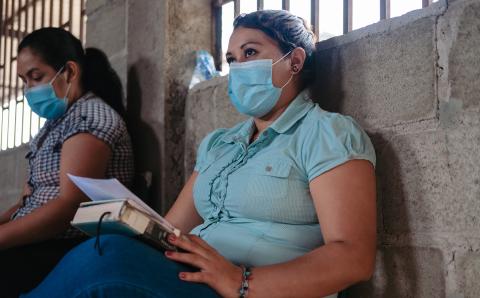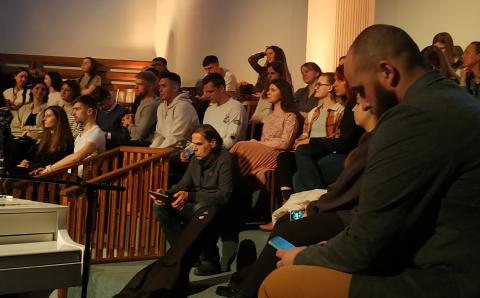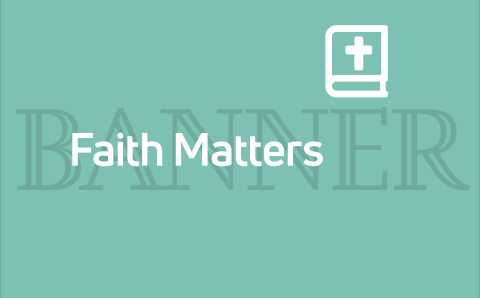The report on human sexuality that came to last year’s annual general assembly of the Christian Reformed Church, is back on the agenda this year as 21 formal requests (overtures) ask Synod 2023 for a change or reversal of Synod 2022’s declarations and recommendations and another three request a delay in implementing the “confessional” or binding status of the interpretation that homosexual sex is rightly categorized as unchaste. Four groups, believing these matters to be of utmost importance for the church, are anticipating the outcomes of this year’s synod and sharing their own messages in hopes of affecting the minds and hearts of CRC members. The descriptions of what each group promotes come from their websites.
The Abide Project
The Abide Project, which began in fall 2021, promotes a “Biblical, confessional, and historical understanding of human sexuality” in the CRC through writings and a bimonthly lecture series on its website. Recently the series interviewed Calvin University administrators about how the clarification made by Synod 2022 on the confessional status of the church’s stance has affected the university. In addition to the online content, Abide recently published a 24-page newsprint magazine for distribution to some CRC churches.
The Abide Project plans to again offer regular live updates from Synod 2023, with commentators describing the happenings of the day as they did at Synod 2022. Two West Michigan CRC pastors, Tyler Wagenmaker and Cedric Parsels, will offer the updates, but without consulting with delegates, according to spokesperson Aaron Vriesman. Vriesman is a delegate as are two other pastors on Abide’s leadership team.
The commentators “try to bring some clarity and different perspectives that might not otherwise be heard or brought forth,” said Vriesman. “We want to make sure these views are well-represented but don’t want any real or perceived subversion of the process at synod.” Additionally, members of Abide are “devoting (themselves) to prayer” and some are fasting in preparation for Synod 2023. No official meeting of Abide members during synod is planned, but it might be a possibility, Vriesman said. Abide intends to host a conference in August, as it did last year.
All One Body
All One Body is a West Michigan-based organization, started in 2011 that promotes “unrestricted participation in all areas of church life by all members who confess Christ as Savior and Lord without regard to sexual orientation or gender identity.” Last year, All One Body members showed up outside the fine arts building where Synod 2023 was meeting when the human sexuality report was first discussed. Waving rainbow flags and wearing colorful clothing, demonstrators carried signs and sang as synod delegates walked through their midst on the way to a meal. At a second demonstration after the HSR was passed, participants wore black as a sign of mourning. This year, a similar demonstration is likely, depending on logistics, said All One Body board member John Chapin. The organization will consult with Calvin University security and will find a new location to gather, since synod will be held in the Calvin University Chapel for the first time. The gathering will again be timed for when delegates are discussing the same-sex marriage issue, said Chapin.
“We want to offer emotional and spiritual encouragement and prayer,” said Chapin. “This is a painful and distressing time for some delegates and observers. We want to be there as witnesses and support.”
All One Body also plans to offer Facebook, email, and website updates during Synod. Its several hundred email subscribers will be notified for the time and place of any demonstration.
One of the All One Body board members was on the delegate list for Synod 2023 but an alternate delegate is now taking that place.
Better Together
Better Together, which began in early 2023, promotes a “a third way—we may not all agree on SSM (same-sex marriage), the recently (recommended) Human Sexuality Report, or its ethical conclusions … but we are committed to creating space for disagreement on ethical issues that do not determine our salvation in service to maintain the prioritization of the mission of the gospel and protect the unity of the church.” During Synod 2023, Better Together plans to offer email and Facebook updates, but will not advocate for any specific response by delegates. “We are resisting political leaning,” said Nate DeJong McCarron of the Better Together steering team.
The group has been growing, he said, with over 600 email list subscribers, about 85% of them American from all over the U.S. “We are providing a viewpoint that seems to be resonating with people,” said DeJong McCarron.
Better Together recently publicized its advisory council, which includes former CRCNA management-level staff including Colin Watson Sr. (executive director emeritus) and Andy Ryskamp (retired World Renew director). Some interested Canadians are starting up a Canadian version of the group, which will operate separately but with the same vision. Better Together will encourage “prayerful engagement” and might offer an in-person gathering for people who are in the area during synod.
Two of the named members of Better Together’s advisory council are delegates to synod.
(Note: prior to the writing of this story, The Banner accepted an ad purchase from this group for its May print edition. After being questioned about the appropriateness of that choice and considering the criticism, Editor Shiao Chong published a clarification statement online and pulled a second planned ad from the group.)
The Hesed Project
The Hesed Project, which began in spring 2022, provides “online resources and stories about faith, sexuality, and gender identity.” It promotes exploring the implications of the CRC’s human sexuality report, considering alternatives to the CRC’s past approaches, and fostering discussion that includes the voices of those most affected by this report. Though Hesed works together with All One Body, its supporters are more geographically dispersed. Hesed “will provide a summary analysis of all the overtures (requests from groups of churches for action at synod), as we did last year,” said organizer Kathy Vandergrift. “This is to inform everyone. It is not a lobby.” Last year’s summary analysis by Hesed was found to be helpful, Vandergrift said.
A panel of unnamed CRC people will contribute that analysis, presenting three potential options delegates to Synod 2023 could pursue, Vandergrift said. The findings will be available on Hesed’s website and distributed to its email list.
Hesed also recently conducted a survey of people in the CRC, asking them to share the impact of Synod 2022’s confessional interpretation. Because the survey could not be conducted through official channels, it is somewhat anecdotal, but offers “real-life accounts by people in our churches,” Vandergrift said. “They are authentic and moving in their genuine expression of what is going on and what effect that has.” The project has shared many CRC members’ stories (often anonymously) via social media and its website and will continue to do that up to Synod 2023. Hesed also published a map showing estimates of the numbers of same-sex-marriage-affirming or welcoming churches in various regions of the Christian Reformed Church. The map indicates 54 such churches (not identified) in Canada and 26 in the U.S.
Hesed does not publicize its members or leadership, so The Banner cannot determine how many, if any, people connected with Hesed are delegated to synod.
It should be noted that each classis (regional assembly) of the CRC elects its own delegates to synod—one minister, one elder, one deacon, and one other officebearer, according to the current reading of Church Order Article 45—any of whom could have any number of affiliations. The Banner is not implying a predisposition for any delegates to synod but attempting transparency regarding these four visible groups. The CRC’s position on homosexuality, reaffirmed at Synod 2022, includes a distinction between same-sex orientation and same-sex relationships. “Persons of same-sex attraction may not be denied community acceptance solely because of their sexual orientation and should be wholeheartedly received by the church and given loving support and encouragement. Same-sex oriented Christians, like all Christians, are called to discipleship, holy obedience, and the use of their gifts in the cause of the kingdom. Opportunities to serve within the offices and the life of the congregation should be afforded to same-sex oriented Christians as well as to heterosexual Christians.” It is same-sex sex that is understood to be “incompatible with obedience to the will of God as revealed in Scripture.”
About the Author
Roxanne VanFarowe is a freelance writer who claims both Canadian and American citizenship and grew up in the Christian Reformed Church. She is a member of Blacknall Presbyterian Church in Durham, North Carolina.









